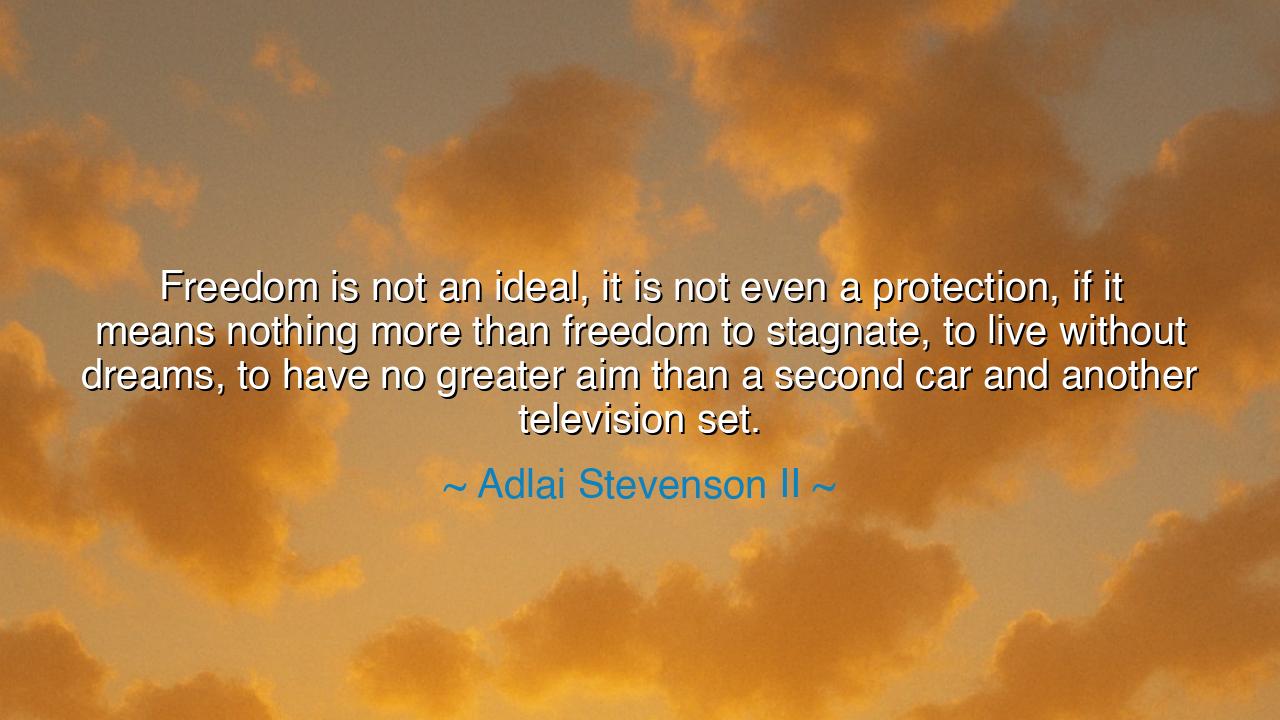
Freedom is not an ideal, it is not even a protection, if it means
Freedom is not an ideal, it is not even a protection, if it means nothing more than freedom to stagnate, to live without dreams, to have no greater aim than a second car and another television set.






In the mid-twentieth century, when the world stood between the ruins of war and the temptations of comfort, the statesman Adlai Stevenson II spoke words that cut to the heart of civilization’s great illusion. He said, “Freedom is not an ideal, it is not even a protection, if it means nothing more than freedom to stagnate, to live without dreams, to have no greater aim than a second car and another television set.” These words, spoken in an age of abundance, ring still with the tone of prophecy — for they warn that freedom without purpose is but another kind of prison, gilded and silent.
Stevenson was a man who had seen both the promise and the peril of democracy. He lived in an era when freedom was loudly celebrated — but often misunderstood. To many, it had become a license for comfort, for the quiet pursuit of possessions rather than ideals. He saw that when a people cease to dream, when they trade vision for convenience, freedom withers into a hollow word. True liberty, he declared, is not the right to do nothing; it is the power to strive, to imagine, to create a better world than the one we inherit. It is not the end of struggle, but the beginning of responsibility.
The origin of his thought lies deep in the philosophy of the republic itself. The founders of democracy did not seek liberty merely to escape tyranny; they sought it so that the human spirit could unfold in virtue and knowledge. Freedom, in its highest form, was meant to awaken greatness — to call forth the philosopher, the artist, the inventor, the citizen who acts not for himself alone but for the common good. Stevenson saw that this vision had dimmed. The people of his time, and perhaps of ours, had begun to confuse abundance with happiness, consumption with progress. In the glow of their television screens, they forgot the inner fire that once built nations.
In the ancient world, the same truth was spoken by those who first pondered the nature of liberty. Aristotle taught that freedom without virtue is chaos, and that the highest life is not one of ease, but of excellence. He warned that when citizens live only for comfort, they become soft, and their city — however strong — will crumble. Likewise, in Rome, Cicero cried that a people who love luxury more than duty are already enslaved, though no conqueror has yet arrived. Stevenson's warning is their echo in modern form: a reminder that material wealth, when unaccompanied by moral purpose, leads not to flourishing but to decline.
Consider the story of Vaclav Havel, the playwright who became president of Czechoslovakia after the fall of communism. When his nation at last gained its freedom, he warned his people that liberty would bring not only joy but peril — for the temptation of comfort was as dangerous as the tyranny they had overthrown. “The real test,” he said, “is not the revolution, but what follows it.” Like Stevenson, he understood that freedom without conscience becomes self-indulgence, and that the soul of a nation is not preserved by wealth or power, but by the courage to dream beyond them.
Thus, Stevenson’s message speaks not only to nations, but to every human heart. Each of us is born with a measure of freedom, yet what we do with it defines our worth. To live merely for possessions is to live half-asleep; to live for ideals is to be truly awake. Freedom must not be the freedom to stagnate, but the freedom to strive — to educate the mind, to cultivate compassion, to serve something greater than oneself. A free life without purpose is a garden untended, its beauty overrun by weeds of complacency.
So let this be the teaching carried forward: Freedom is sacred only when it bears fruit. Use it not to build walls of comfort, but bridges of hope. Do not let your dreams be traded for distractions; do not let your liberty sink into laziness. Remember that the gift of freedom is also a summons — a call to live nobly, to lift others as you rise, to seek meaning beyond consumption. Let your dreams be your measure, not your possessions; your conscience, not your comfort. For as Stevenson knew, the truest freedom is not the right to have, but the courage to become.






AAdministratorAdministrator
Welcome, honored guests. Please leave a comment, we will respond soon